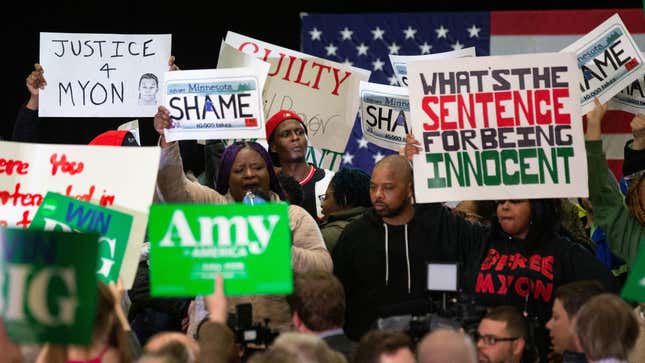Klobuchar Cancels Rally After Protesters Remind Voters of Her Biggest Prosecutorial Blunder
Politics

Everyone already forgot about Klobmentum—Senator Amy Klobuchar’s brief uptick in a few Democratic primary polls following a solid debate performance and a surprising third place win in New Hampshire. But the White House hopeful’s path to victory is virtually non-existent, and it isn’t helped by unearthed information about Klobuchar’s past as the County Attorney of Hennepin County, Minnesota. Specifically, her office’s involvement in the life imprisonment of Myon Burrell, a black teenager who was convicted of killing an 11-year-old girl in 2002 based on a mountain of dodgy evidence.
Dozens of protesters flooded a Klobuchar rally in the senator’s home state Sunday, demanding Burrell’s release. The protesters even made their way on stage, using megaphones to chant “Klobuchar has got to go” and “Black lives matter” and “Free Myon.” Klobuchar supporters attempted to drown out the protesters from time to time, but they were no match. The rally was meant to start at 8 p.m. After a 40-minute delay, the rally was canceled.
Klobuchar’s campaign manager, Justin Buoen, told reporters that the campaign initially agreed with the organizers to meet with Klobuchar onsite.
“[Klobuchar] was in the room, ready to meet with them, and then [the protesters] changed the terms and decided they didn’t want to meet with her,” Buoen said, adding that he was disappointed by the outcome. A reporter challenged Buoen’s claim, saying that organizers insist that it was the Klobuchar camp that backed out of the arrangement. Additionally, the Star Tribune reported that, according to protest leaders, the Klobuchar campaign, “would not meet their demand to publicly acknowledge Burrell during the rally.”
-

-

-

-

-

-

-

-

-

-

-

-

-

-

-

-

-

-

-

-

-

-

-

-

-

-

-

-

-

-

-

-

-

-

-

-

-

-

-

-








































